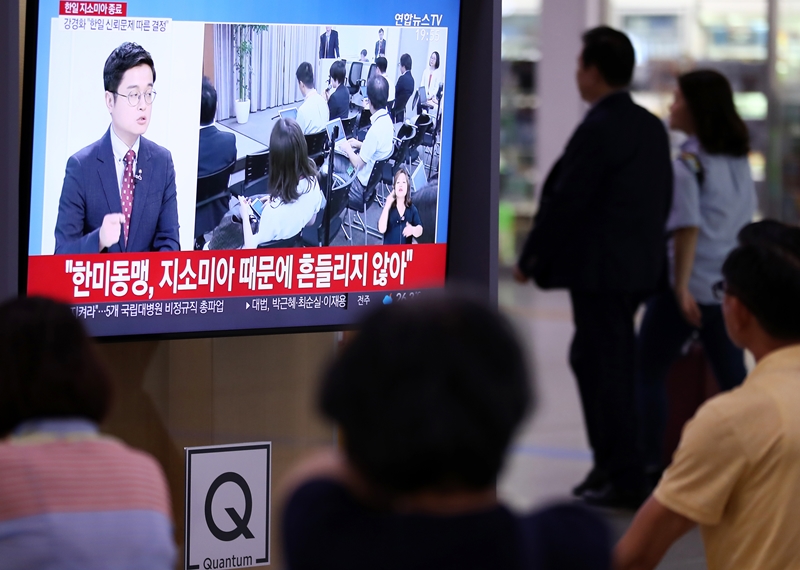
A large TV screen at Seoul Station on Aug. 22 broadcasts the government's official announcement on the termination of the General Security of Military Information Agreement, a military intelligence-sharing pact with Japan ratified in 2016. (Yonhap News)
By Park Hye Ri and Lee Jihae
Cheong Wa Dae on Aug. 22 announced that the government will terminate the General Security of Military Information Agreement (GSOMIA), a military intelligence-sharing pact with Japan.
The decision comes in response to a series of trade sanctions on Korea by Japan including restrictions on the export of strategic materials and the removal of Korea from a whitelist of preferential trading partners. Seoul's announcement on the agreement's cancellation came two days before the deadline for an extension.
Ratified in November 2016, GSOMIA had the two countries agree to share intelligence on North Korea's nuclear weapons and missiles. Tokyo and Seoul have exchanged military intelligence 29 times since the agreement's ratification, including seven this year.
Kim You-geun, deputy director of Cheong Wa Dae's national security office, blasted Japan's "groundless" removal of Korea on Aug. 2 from the former's whitelist as a breach of bilateral trust, saying the action "gravely affects" the environment of cooperation in national security between the two countries.
"Under such circumstances, it would no longer suit our national interest to continue GSOMIA, which was ratified for the two countries to share sensitive military intelligence for the sake of national security," he said.
Last month, Japan announced export curbs on Korea for chemicals that are key components of semiconductor production. Korea's decision to terminate GSOMIA came 53 days after the trade dispute began and before Japan's expected removal of Korea from the whitelist on Aug. 28.
An anonymous Cheong Wa Dae source cited Japan's removal of Korea from the whitelist and said, "Japan doesn't consider Korea a cooperative partner for national security but rather as a country that it must regulate through restrictions on exports of strategic materials. Such an attitude by Japan shakes the foundation of bilateral cooperation in national security."
The government also blamed Japan for a lack of response on the issue despite Korea's efforts to resolve it.
Given the importance of bilateral relations, the source said Cheong Wa Dae has considered multiple ways to reach a constructive solution. Yet Japan refused to hold a bilateral summit when it hosted the G-20 summit in Osaka in June and has not responded to Korea's two dispatches of special envoys.
"In the Aug. 21 bilateral meeting of foreign ministers, Japan didn't even show the slightest change in its stance. It also hasn't issued an official response to President Moon Jae-in's speech on Korea's 74th National Liberation Day," the source added.
"We will reconsider (our termination of) GSOMIA and other measures if Japan withdraws its unjust and retaliatory actions against Korea and the relationship between the two countries improves."
hrhr@korea.kr